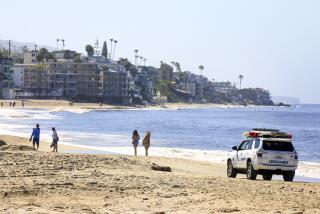Park-Renaming Advocates Get Apology From Carson Mayor : Samoan-Americans: Group seeking to honor late city employee had resented mayor’s doubts about his volunteer service.
- Share via
Carson Mayor Michael Mitoma, stung by criticism after he questioned the volunteer work of a city worker a community group wants to honor, has apologized for his remarks.
The apology came after Mitoma was denounced for making “insensitive” comments about the amount of volunteer time contributed by Harry T. Foisia, a city employee and Samoan-American widely known in the community for his work with troubled youths. Mitoma issued the apology at Tuesday’s City Council meeting.
After Foisia’s death last December at 39, his family and supporters asked the council to rename Winfield Scott Park after him.
The council in June rejected that idea in favor of naming the city’s emergency operations center in the City Hall basement after Foisia. At the time, council members said they did not want to set a precedent by naming a park after a city worker.
However, in response to pressure from a committee of community members, the council decided Tuesday to reconsider renaming the park at its next meeting Oct. 1.
Members of the group said they were insulted by the council’s decision to name the emergency operations center for Foisia, and were angry that the council would not reconsider renaming the park.
The group’s leaders said the city consistently ignores the contributions of its Samoan residents and has treated them unfairly--charges the city denies.
The group pointed to the dedication of four other city parks, three of which were named after African-American community leaders. The fourth was named after former Councilman John Calas, who was white and the late husband of current Councilwoman Kay Calas.
The group has maintained that the council did not scrutinize the credentials of these other community leaders in the way Foisia’s were questioned.
A popular city code enforcement manager, Foisia was revered in the Samoan community and had the title “high chief” bestowed on him during a visit to American Samoa in 1986. In lobbying to have the park renamed, Foisia’s supporters told the council that he had put in at least 30,000 hours of volunteer work, much of it in efforts to reform gang members, since the late 1960s.
Mitoma was criticized by the group for expressing disbelief about the amount of volunteer work Foisia contributed. “Quite frankly, I did not see the volunteer work at 40 hours a week over the last five years,” Mitoma said during an August council meeting.
Mitoma said he opposes naming any park after an individual, and added that Foisia’s supporters attempted to pressure him by threatening to oppose his re-election next year if he did not vote to rename the park.
Myron Thompson, the committee’s chairman, said in a written statement to the council that individual members may have made such comments. But the committee as a whole made no such threats.
Liz Foisia, Foisia’s sister-in-law, asked Mitoma at Tuesday’s meeting to apologize for remarks she said were tantamount to “character assassination.”
“This issue has raised a consciousness of pride and determination to preserve one’s dignity and honor, such as that Harry possessed,” Liz Foisia said. “This is why the committee (is addressing) the injustice put upon Harry’s memory by insensitive remarks by the mayor, statements that reflected serious doubts to Harry’s character and merit.”
Mitoma said it was not his intention “to embarrass Harry.”
“I feel badly that it was so interpreted,” Mitoma said. “Merely, I asked several questions. . . . If you interpreted that as an assassination on Harry’s character, I apologize. That was not my intent.”
The group accepted the apology but pledged to continue efforts to rename the park. Before the city’s incorporation in 1968, Scott Park belonged to Los Angeles County. Winfield Scott was a famed general in the Mexican War and was commander of the Union Army at the outbreak of the Civil War.
More to Read
Sign up for Essential California
The most important California stories and recommendations in your inbox every morning.
You may occasionally receive promotional content from the Los Angeles Times.










